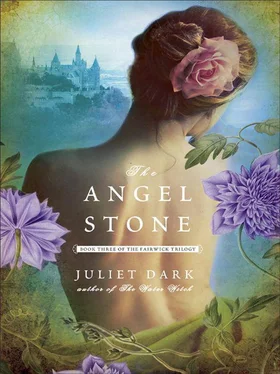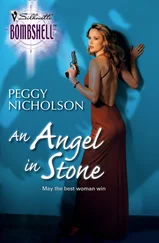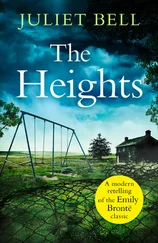“I’ll no’ have ye takin’ my nephew away before I have a chance to box his ears for making us all worry these long years.”
“Aunt Nan!” William exclaimed. The woman’s hair was longer and not yet gray, her blue eyes unclouded by cataracts, but she was identical to Mac Stewart’s nan, whom I’d met at Shady Pines Assisted Living a few weeks ago—or, rather, three hundred plus years from now.
“Nan Stewart?” I asked.
She narrowed her keen blue eyes at me. “Aye, do I know ye? You look a bit like Katy Brodie.”
I realized my mistake. This woman must be an ancestor of Mac’s grandmother. I didn’t want the village thinking I was Katy, which I assumed must have been the name the fairy girl had gone by. “No, it’s just that William’s spoken of you.”
William gave me a quizzical look. The number of falsehoods being bandied about was making me dizzy. Nan Stewart may not be Mac’s nan, but she was the closest thing to a sympathetic face in the crowd. I nudged William. “And I’m sure he wants to explain to you where he’s been. Don’t you think we should go with your aunt now ?”
“Aye, a good idea—”
“You’re not going anywhere, William Duffy,” Jeannie announced, with a stamp of a pretty, slippered foot, “before ye tell me whether or no’ you have come back to fulfill your promise and marry me.”
“Aye, I’d like the answer to that question, as well.” A broad, grizzled gentleman dressed in finer clothes than the rest of the townspeople had appeared at Jeannie’s side. Her father, no doubt. “Or should I be summoning my lawyer to draw up charges of breach of promise?”
I looked at William and noticed that he had turned a slightly greenish hue. I felt sorry for him until he opened his mouth and said, “I cannot marry ye, Jeannie, as I’m already wed to this lady here.” He took my hand and held it up so that the sun struck the emerald and diamond ring I wore on my right hand—the ring Liam had given to me. The emerald is the color of your eyes when we make love , he had told me when he put the ring on my finger. I felt a strange stab of disloyalty as William claimed it as proof of our engagement, a feeling that mingled with the rather petty enjoyment of watching Jeannie’s face turn livid with jealousy, and that finally resolved into pique that William had claimed me as his own in the marketplace without consulting me.
“If that be the case, then you will be hearing from my lawyers. And,” Jeannie’s father added over his shoulder as he steered his outraged daughter away from the square, “the kirk session will be interested to hear this story of pirates. To me, it sounds suspiciously of witchcraft.”
William opened his mouth to reply, but his aunt put a warning hand on his arm and answered instead. “I’m sure the lad only did what was right, Hamish MacDougal. As for the kirk, I haven’t heard yet that being kidnapped by pirates is proof of witchcraft.” She steered William, who still gripped my hand, in the opposite direction from where Jeannie and her father had gone, leading the way down a narrow alley. When we’d gotten away from the square, I turned on William.
“How could you claim me as your bride in front of all those people without asking me first?” I demanded.
William’s mouth dropped at my question. “It was all I could think of to keep from having to marry Jeannie MacDougal. After last night I didn’t think you’d mind.”
“Last night I didn’t know you were engaged to another woman!”
“I didn’t know it myself! I had no idea that Jeannie MacDougal would be waiting for me all these years. Her father is the richest man in town and an elder of the kirk. When I was courting her, she was the most sought-after girl in all of Ballydoon. I’d have thought she’d wed a month after I vanished.”
“Clearly she isn’t as fickle as you are.”
“Fickle? Me? I didn’t notice you worrying overmuch last night about your Bill or Liam.”
“What are you talking about? Bill and Liam were you !”
“I don’t see how they can be me if I don’t remember them and I have been in Faerie all these years—”
“Fucking everything that moves!”
William’s eyes flew open wide at the expletive. “Only because the Fairy Queen made me!”
Nan, who’d reached her front door, wheeled on us. “Do the two of ye dunderheads want to be taken as witches right this minute with all your talk of fairies?” she cried. “Do you not know that traffic with the fairies is considered an admission of witchcraft?”
I did, in fact, remember something of the kind from a class I’d taken on the European witch hunts. From 1597, when James VI proclaimed in his work Daemonologie that any occurrence of the supernatural came from the devil, witch hunters throughout the first half of the seventeenth century prosecuted anyone who admitted—often under torture—that they’d had contact with the gude neighbors . The furor culminated in a massive witch hunt that claimed more than three hundred lives …
“In 1659!” I said aloud. “Nan’s right. The country’s on the verge of one of the worst witch hunts in Scottish history.”
Nan stared at me for a moment, then wordlessly turned, opened her door, and pulled me through it into a small, neat, homey parlor with cushioned chairs by a fireplace, a spinning wheel, and bunches of fragrant herbs hanging from the low roof beams. She locked the door behind us, drew the lace curtains at the windows, and poked her head into an adjoining room—presumably to check if we were alone. Then she took me by both hands, drew me down onto a bench in front of the hearth, and stared hard into my eyes.
“Who are ye?” she asked. “You do look a mite like that demented girl who wandered out of the Greenwood, but I can see you’re not her. How do you know what will happen in the future, and how did you know me? Are ye one of …” She licked her lips and looked nervously around the room. “One of the fair folk?”
I looked up at William, who was hovering nervously above us. “Nay, Auntie, she’s the one who saved me from them.”
“So that is where ye’ve been. I thought it might be the case when ye went missing and that girl showed up in the village the next day.”
“Was her name Cailleach?”
“Aye,” Nan said, eyeing me suspiciously. “That’s what she said her name was, but it’s not a Christian name, so we called her Katy. She was not right, puir thing. She was ravin’ about having lost her way to a door and that all her folk would die. I asked her about William, and she just wept the harder and told me he’d been taken by the Queen of Elphame and it was all her fault. I didn’t know, though, if she were raving or telling the truth—and I knew that, if it were the truth, if she kept on like that she’d be taken as a witch. I looked after her until Malcolm Brodie, whose own wife had died the year before leaving him with two motherless bairns, fell in love with her and married her. We thought she’d settled down when she had her own bairn, but then the witch hunters came and she ran away. We never did see her again.” She looked at me. “If you’re not her, what are you? Witch or fey?”
I considered lying, but I felt an instinctive trust of Nan, perhaps because I knew her descendants in the twenty-first century and there were no people more trustworthy than the Stewarts. “A bit of both,” I replied, and then proceeded to tell her my story as honestly as I could, translating the details of the twenty-first century into terms a seventeenth-century woman would understand. She listened patiently, stopping me only when I got to the part about the nephilim. She made me go back and describe them.
“Aye, I know their ilk. I believe that some of the witch hunters may be those devils. Their kind have been abroad in the country for many years now. They are the ones behind the war on the auld folk and all who hold the old ways. They have outlawed the minstrels and tale-tellers—all those who tell the old stories—because it’s in those old stories that lie the secrets to destroy them. They’re the inquisitors who trick hapless old women into telling tales of the little folk and then accuse them of consortin’ with the devil, because they are afraid that any who know the old ways will know how to destroy them.”
Читать дальше








![Twelve Winged Dark Burning Angel - Супер Ген Бога. Том 2 [101-200 главы]](/books/412125/twelve-winged-dark-burning-angel-super-gen-boga-tom-2-101-200-glavy-thumb.webp)
![Twelve Winged Dark Burning Angel - Супер Ген Бога. Том 1 [1-100 главы]](/books/412126/twelve-winged-dark-burning-angel-super-gen-boga-tom-1-1-100-glavy-thumb.webp)


